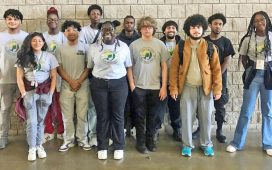Some Americans may have lost hope for humanity amid the death of George Floyd, but a new study reveals not all is lost, as people really do want to be kind to each other.
Researchers found that people overwhelmingly choose to be generous to others, even if it is at the cost of themselves and regardless of external motives.
The study, conducted online, asked participants to give money to other people, which the team assumed would lead to subjects anticipating something in return for their generosity.
However, the experiment revealed volunteers were largely willing to hand strangers cash without any motivation behind it – just the notion of helping the individual.
Scroll down for video

Researchers found that people overwhelmingly choose to be generous to others, even if it is at the cost of themselves and regardless of external motives
‘We observe a ‘help enough or do not help at all’ dynamic, with participants giving more when they had no reason to expect reciprocation from someone (i.e., in the control condition) than to others who had previously helped them but not very much, reads the study in Scientific American conducted by teams at The Ohio State University and the University of South Carolina.
David Melamed, lead author of the study and an associate professor of sociology at The Ohio State University, said: ‘We wanted to do an exhaustive study to see what the effects of those motivations would be when combined – because they are combined in the real world, where people are making choices about how generous or kind to be with one another.’
Melamed and his team invited more than 700 people to participate in the study online.
The group used the four main motivators when it comes to helping other people.

The study, conducted online, asked participants to give money to other people, which the team assumed would lead to subjects anticipating something in return for their generosity. Subjects were given different scenarios (pictured) to help them decide on when and how much to give

However, the experiment revealed volunteers were largely willing to hand strangers cash without any motivation behind it – just the notion of helping the individual
One is the idea that someone is inclined to do something nice for someone else with the motive of gaining – the notion of ‘you scratch my back and I’ll scratch yours.’
The second involves observing an act of kindness and reciprocating and the third is a person’s doing good in the presence of people in their network who might reward their generosity.
The final motivator is a person likely to ‘pay it forward’ to someone else if someone has done something nice for them.
These motivators have been studied in the past, but have only been looked at individually or two at a time.
Melamed and his team are the first to investigate how all four interact and affect one another in a real world setting.
‘In the real world, the conditions under which people are nice to each other are not isolated – people are embedded in their networks, and they’re going about their daily lives and coming into contact with things that will affect their decisions,’ Melamed said.
‘And these experiments show that all the motivations work. If you want to maximize prosocial behavior, it was a really great thing to see.’
For this study, which was done online, participants had to decide how much of a 10-point endowment to give to other people – these point shad monetary value.
Melamed had hypothesized that kindness might cancel each other out.

Some Americans may have lost hope for humanity amid the death of George Floyd, but a new study reveals not all is lost, as people really do want to be kind to each other
For example, a person may be less apt to indirectly reward another’s generosity toward a third person when he is focused on directly giving back help that he received.
‘People have a self-bias,’ Melamed said.
‘If you do something nice for me, I may weigh that more than if I see you do something nice for someone else.
‘But we found that all the motivators still show up as predictors of how much a person is willing to give to someone else, regardless of how the differing motivators are combined.’
Each volunteer was paid endowment of 10 points for every decision they made in various scenarios designed to contain combinations of motivators to share income.
This research helps us understand the remarkable quantity and diversity of prosocial behavior we see in humans, Melamed said.
‘From an evolutionary perspective, it’s kind of perplexing that it even exists, because you’re decreasing your own fitness on behalf of others,’ he said. ‘And yet, we see it in bees and ants, and humans and throughout all of nature.’
Thousands of Americans have hit the streets over the past few weeks to protest the death of Floyd, an unarmed black man killed while in police custody.
And most of them are doing so at the cost of themselves and the motivation of ending police brutality.







